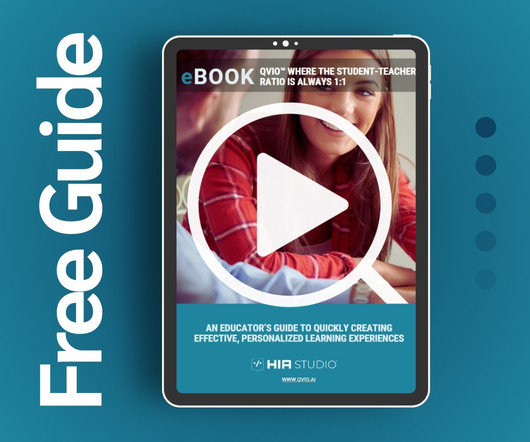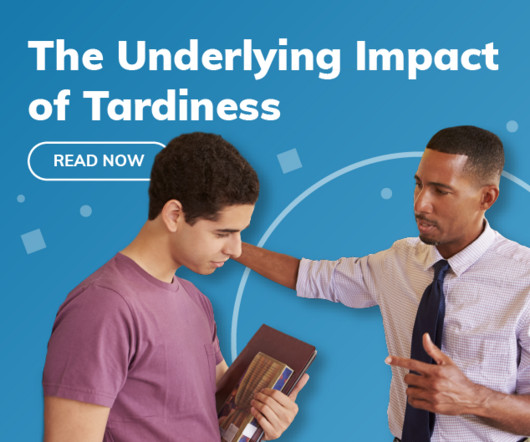8 Things to Keep in Mind When Executing a Digital Transformation
EdTech Magazine
JANUARY 3, 2017
By Eric Sheninger By following a process, K–12 leaders can be assured they are making the most of education technology.

EdTech Magazine
JANUARY 3, 2017
By Eric Sheninger By following a process, K–12 leaders can be assured they are making the most of education technology.

The CoolCatTeacher
JANUARY 3, 2017
Appreciating teachers and the role we play in the world From the Cool Cat Teacher Blog by Vicki Davis Follow @coolcatteacher on Twitter. Wow, you know as a teacher you just can’t turn it off. I was just in Walgreens picking up pictures, and as I was walking in, a little one-year-old decided to walk out through the open door. I scooted out and followed him and took his tiny hand as his alarmed grandmother was grateful I brought him back.
This site is protected by reCAPTCHA and the Google Privacy Policy and Terms of Service apply.

Catlin Tucker
JANUARY 24, 2017
“When I engage in dialogue, I recognize that those I speak with are equal to me, and I work from the assumption that they hold within them wisdom, knowledge, ideas, and gifts.” That line from Jim Knight’s book Unmistakable Impact highlights the power of dialogue as a vehicle to learn from the people around us. The value of discussions can hardly be overstated.

Ask a Tech Teacher
JANUARY 4, 2017
We hear from readers all the time about how much they rely on Ask a Tech Teacher for tech-in-ed resources. Weekly, we share favorite websites, apps, and pedagogy that make a difference in the classroom. This year, for the first time, we’ll share which tools had the greatest impact on readers. To award this Best in Category badge, we looked for the uncommon resources (meaning: not the ones everyone knows about, like Khan Academy) most visited by our readers in each category.

Generative AI holds tremendous promise for all stakeholders in higher education. But guardrails are needed. Strong governance that empower instructors are at the core of a responsible approach to using generative AI in academia.

Ed Tech from the Ground Up
JANUARY 19, 2017
Startup incubators provide access to experts around everything from sales to technology. They key is to find the right one and land a spot. The post Finding, Pitching, and Prospering Through a Startup Incubator appeared first on Market Brief.

The Journal
JANUARY 3, 2017
While OER marketplaces tend to tout the amount and types of content on offer, we must remind ourselves that content is not curriculum — and it is curriculum that teachers actually want. We go on to describe the life-cycle of a digital lesson — and argue that support for all the life cycle phases is only just beginning to be provided.
EdTech Update brings together the best content for education technology professionals from the widest variety of industry thought leaders.

The CoolCatTeacher
JANUARY 6, 2017
What we can learn from the media's silence about the South Georgia Storm Disaster 2017 From the Cool Cat Teacher Blog by Vicki Davis Follow @coolcatteacher on Twitter. Is it that we don’t have a dead baby in a ditch like we had in the Camilla tornadoes in 2000 to get people upset? Is that Albany Georgia’s tragedy is ignored? Or is it just that the news media is so busy covering reality DC that they don’t have time to report on a storm that left 8,000 homes without power and my

Catlin Tucker
JANUARY 9, 2017
I don’t typically make “pie in the sky” New Year’s resolutions, but. this year I am bound and determined to move ALL assessment into the classroom! Click To Tweet This may sound like a crazy resolution given that most teachers spend hours of time outside of school assessing their students’ work. However, there are three reasons I’d argue we should NOT spend our time outside of class grading: Our prep time is better spent designing creative and engaging lessons

Ditch That Textbook
JANUARY 2, 2017
In 2004, I was about to start my first teaching job. That’s when I got introduced to the world. I went on a 10-day mission trip to Uruguay. We drove the streets of Montevideo, a world capital that reminded me a lot of life in the United States. We walked through centuries-old Colonia del Sacramento, [.].

A Principal's Reflections
JANUARY 1, 2017
Another Christmas has passed and I am continually amazed by the technologies that kids now have access to. For example, my son received a drone from my mother-in-law and has been playing with it non-stop for days now. At first, he was focused on just the basics of flying the device. After having mastered take off, landing, and balance, his focus now is on using the camera to take photos and video.

Advertisement
Schools face increasing challenges as technology becomes integral to education. Efficient device management is essential for maximizing technology use and safeguarding investments. Our article discusses the importance of tracking devices, outlines current challenges, and suggests modern solutions that go beyond traditional methods like Excel. Learn how advanced tracking systems can streamline operations, improve maintenance, and offer real-time updates for better resource allocation.

EdNews Daily
JANUARY 4, 2017
Katharine, can you please tell us a little bit about your background? I have been teaching English as a Foreign Language since 2003, so over 14 years. I finished my undergraduate degree at the University of Massachusetts in 2002. After finishing I decided I still had a lot of the world that I wanted to see, so I enrolled in a TEFL course in Guadalajara, Mexico.

EdTech Magazine
JANUARY 5, 2017
By Amy Brown Physical environments are being adapted with students and mobility in mind.

The CoolCatTeacher
JANUARY 2, 2017
Living life to the fullest every day. From the Cool Cat Teacher Blog by Vicki Davis Follow @coolcatteacher on Twitter. I live across the street from death. Truthfully, I wouldn’t have chosen to live across from the funeral home, but it was my grandparents’ house. Contrary to what you might think, a constant reminder of death can change your life in positive ways if you let it.

Catlin Tucker
JANUARY 30, 2017
Check out my conversation with the lovely ladies who host CNUSDEchat podcast , which is officially launching February 1st! We had the opportunity to chat about blended learning, flexible classroom spaces, and the importance of placing students at the center of learning! Listen Now! The CNUSDEdchat podcast also has conversations with Doug Fisher, Nancy Frey, and Jessica Fuller available!

Advertisement
How can we actively engage learners 24/7, on their level and according to their interests, while respecting their learning styles? It’s not impossible. In this guide: Explore how to transform traditional, one-way videos into two-way interactive learning experiences Understand different types of artificial intelligence (AI), including - Generative vs.

User Generated Education
JANUARY 2, 2017
I absolutely love all of the new robotics toys that have been coming out for elementary age learners. I have been using them for my summer maker camp, with my gifted education classes, and for my upcoming Saturday morning program. One of my gifted girls noted, “Where do all of these robots come from?” I laughed and told her, “It’s actually has become one of my passions.

Ask a Tech Teacher
JANUARY 24, 2017
I’ve written a lot lately about the benefits of using videos in your classroom. Guest author, Emily Clearly over at mysimpleshow has ten more reasons why videos are a great educational tool for your teaching: Videos are in line with the technological times and can be accessed on the Internet at any point, from wherever you are in the world. Education is something that will never go out of style.

Ed Tech from the Ground Up
JANUARY 3, 2017
Vocabulary learning is like a dimmer switch--with the right techniques eventually students will shine. The post Ed-Tech Tools and Traditional Strategies Enhance Vocabulary Learning appeared first on Market Brief.

EdTech Magazine
JANUARY 31, 2017
By Meghan Bogardus Cortez Classroom tech and data will continue to boost learning outcomes.

Speaker: Andrew Cohen, Founder & CEO of Brainscape
The instructor’s PPT slides are brilliant. You’ve splurged on the expensive interactive courseware. Student engagement is stellar. So… why are half of your students still forgetting everything they learned in just a matter of weeks? It's likely a matter of cognitive science! With so much material to "teach" these days, we often forget to incorporate key proven principles into our curricula — namely active recall, metacognition, spaced repetition, and interleaving practice.

The CoolCatTeacher
JANUARY 31, 2017
Learning and Sharing Can Spread from Teacher to Teacher with George Couros From the Cool Cat Teacher Blog by Vicki Davis Follow @coolcatteacher on Twitter. As a teacher, there is nothing worse than irrelevant, impractical and (dare I say it?) boring professional development. In fact, I learn more from other teachers both in my school and online than I have from most professional development.

Catlin Tucker
JANUARY 16, 2017
When I work with elementary teachers, one of the biggest concerns I hear about is the fear of what students will find online. Teachers know it’s important to teach students how to search effectively, evaluate website credibility, and cite their sources, but it can be scary when teachers are working with younger students. One way to teach these important skills, while keeping students safe online, is to create a custom search engine.

Neo LMS
JANUARY 12, 2017
The educational system as we know it needs a revamp. Actually, a revamp is not enough. The educational system needs to be restructured. A lot of things need to change, and the sooner that happens, the better. Too many students drop out of school, and this isn’t the way to get successful citizens to lead their country forward. There are many reasons behind high dropout rates , but many seem to stream from the same sources.

Ask a Tech Teacher
JANUARY 27, 2017
Moodle is an open source free cloud-based learning platform used by over 96 million people to create over 11 million courses. These can be a simple activity or a fully-featured course. The platform offers a plethora of tools to customize courses as pretty much whatever teachers need, including: Upload video, audio, and links. Engage students in a discussion forum or a survey.

Advertisement
Managing a K-12 campus with constant pressure to meet performance metrics is challenging. And tardiness can significantly limit a school from reaching these goals. Learn more about why chronic lateness matters, and key strategies to address the following impacts: Data errors caused by manual processes Low attendance and graduation rates that affect a school’s reputation Classroom disruption, which leads to poor academic performance High staff attrition and “The Teacher Exodus” Unmet LCAP goals t

A Principal's Reflections
JANUARY 29, 2017
I think, for the most part, everyone strives for success. We want to be successful in our professional as well as our personal lives. I strived to be the best possible principal for my students, staff, and community. Whether I was successful is a matter of perspective. My evaluations seemed to support the fact that I might have been. I was far from perfect, but always strived for constant improvement.

EdTech Magazine
JANUARY 23, 2017
By Meghan Bogardus Cortez A simplified ed tech evaluation process is on the horizon.

The CoolCatTeacher
JANUARY 27, 2017
A simple strategy any teacher can use to improve teaching From the Cool Cat Teacher Blog by Vicki Davis Follow @coolcatteacher on Twitter. We teachers are too busy. There’s too much to do! But eleven years a go, I hit upon something that works for me. I realized that I didn’t have much time, but I could take 15 minutes just two or three times a week to learn and try new things.

Ed Tech from the Ground Up
JANUARY 26, 2017
At Communication APPtitude we developed our product before our business plan. For us, it worked. The post Building a Startup Business Backwards: Why It Can Work appeared first on Market Brief.

Speaker: Chris Paxton McMillin, President of D3 Training Solutions
There are plenty of great authoring tools for developing eLearning, but the one you select could directly impact your course's outcomes. Depending upon your learners’ needs and your organization’s performance goals, you could be overlooking considerations that impact the both effectiveness of your courses and how long it takes to finish them. From general capabilities to specific workflow structures, some aspects are critical when it comes to learning objectives and deadlines.

EdTech4Beginners
JANUARY 6, 2017
Apple TV’s allow you to stream your iPad screen to another device such as a projector. They are invaluable in the classroom and have so many uses. How do you set it up? It is really easy to set up an Apple TV. Watch the YouTube video below for details: How can Apple TV be used in the classroom? Show a pupil’s work to the whole class. Share a student solving a problem on their iPad with the whole class; they can present the information easily by talking through their methods.

Digital Promise
JANUARY 17, 2017
The Verizon Innovative Learning Schools (VILS) directed by Digital Promise initiative is actively improving learning opportunities for students and teachers in 46 middle schools across 14 states and the District of Columbia. In addition to providing teachers and students with always-available access to technology, every VILS location promotes STEM principles across the curriculum.

Ditch That Textbook
JANUARY 12, 2017
One huge drawback of using Google Classroom has beenthe inflexibility of creating assignments. Everything you assigned had to go to every student. Deliver assignments to small groups? Ha! Differentiate to subsets of students? Nah. Until now. Google announced a few changes to Google Classroom, and this one was the bombshell: assign activities to small groups [.].

EdTech Magazine
JANUARY 12, 2017
By Jena Passut The former Reading Rainbow host shares the power of storytelling in his life and beyond.

This white paper examines and proposes revisions to the "Seven Principles for Good Practice in Undergraduate Education" introduced by Arthur Chickering and Zelda Gamson in 1987 for today's technology-driven world.
Let's personalize your content